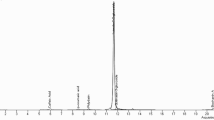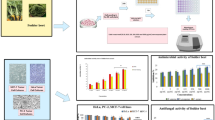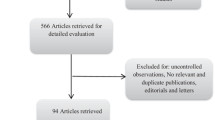Abstract
Background
Although prostate cancer is the most commonly diagnosed cancer in men, its incidence among Asians, who consume foods rich in phenols, is relatively low compared with that in other populations. Cocoa bean husk (CBH) is an important by-product of the cocoa industry; its polyphenol content (catechin, epicatechin, and procyanidin B) is as high as that of cocoa beans. However, there are no studies on the anticancer effect of CBH. Herein, we assessed the antioxidant and anticancer effects of CBH on prostate cancer cells.
Objectives
We fractionated CBH ethanol crude extract and compared the total polyphenol content, total flavonoid content, and DPPH and ABTS+ radical scavenging activities of the fractions. Catechin, epicatechin, and procyanidin B were analysed by HPLC in the ethyl acetate (EAF) and butanol (BF) fractions, which had the highest physiological content and antioxidant activity. PC3 and DU145 cells were treated with the two fractions, and annexin V/propidium iodide, and TUNEL assays were performed to assess apoptosis and DNA fragmentation, respectively.
Results
The highest phytochemical content and antioxidant activity were observed in EAF, followed by those in BF. HPLC analysis revealed high content of phenolic compounds in both these fractions. Notably, catechin (5.64 mg/g), epicatechin (20.47 mg/g), and procyanidin B (20.29 mg/g) were abundant in EAF. Both fractions induced apoptosis in a concentration-dependent manner in PC3 and DU145 cells, and DNA fragmentation at a concentration of 200 μg/mL.
Conclusion
CBH, a by-product of cocoa processing, contains large amounts of phenolic compounds and exhibits high antioxidant activity and anticancer effects on prostate cancer cells. CBH has potential applications as a functional food material.




Similar content being viewed by others
References
Agarwal C, Singh RP, Agarwal R (2002) Grape seed extract induces apoptotic death of human prostate carcinoma DU145 cells via caspases activation accompanied by dissipation of mitochondrial membrane potential and cytochrome c release. Carcinogenesis 23:1869–1876
Altintop MD et al (2016) Synthesis and evaluation of naphthalene-based thiosemicarbazone derivatives as new anticancer agents against LNCaP prostate cancer cells. J Enzyme Inhib Med Chem 31:410–416
Arnold JT, Isaacs JT (2002) Mechanisms involved in the progression of androgen-independent prostate cancers: it is not only the cancer cell’s fault. Endocr Relat Cancer 9:61–73
Avelar MM, Gouvêa CM (2012) Procyanidin B2 cytotoxicity to MCF-7 human breast adenocarcinoma cells. Indian J Pharm Sci 74:351
Caporali A et al (2004) The chemopreventive action of catechins in the TRAMP mouse model of prostate carcinogenesis is accompanied by clusterin over-expression. Carcinogenesis 25:2217–2224
Choi J, Kim N, Choi HY, Han YS (2019) Effect of cacao bean husk powder on the quality properties of pork sausages. Food Sci Animal Resourc 39:742
Connors SK, Chornokur G, Kumar NB (2012) New insights into the mechanisms of green tea catechins in the chemoprevention of prostate cancer. Nutr Cancer 64:4–22
Dai J, Mumper RJ (2010) Plant phenolics: extraction, analysis and their antioxidant and anticancer properties. Molecules 15:7313–7352
Gupta S, Ahmad N, Nieminen A, Mukhtar H (2000) Growth inhibition, cell-cycle dysregulation, and induction of apoptosis by green tea constituent (-)-epigallocatechin-3-gallate in androgen-sensitive and androgen-insensitive human prostate carcinoma cells. Toxicol Appl Pharmacol 164:82–90
Hernández-Hernández C et al (2019) Cocoa bean husk: Industrial source of antioxidant phenolic extract. J Sci Food Agric 99:325–333
Hu S, Kim B, Baik M (2016) Physicochemical properties and antioxidant capacity of raw, roasted and puffed cacao beans. Food Chem 194:1089–1094
Indiarto R, Pranoto Y, Santoso U (2019) In vitro antioxidant activity and profile of polyphenol compounds extracts and their fractions on cacao beans. Pak J Biol Sci 22:34–44
Ioannone F et al (2015) Flavanols, proanthocyanidins and antioxidant activity changes during cocoa (Theobroma cacao L.) roasting as affected by temperature and time of processing. Food Chem 174:256–262
Kang S et al (2015) Hirsutenone in Alnus extract inhibits akt activity and suppresses prostate cancer cell proliferation. Mol Carcinog 54:1354–1362
Kim KH et al (2004) Extraction and fractionation of glucosyltransferase inhibitors from cacao bean husk. Process Biochem 39:2043–2046
Kim Y, Lee J, Cho Y, An B (2012) Anti-oxidative and anti-inflammatory effects of the solvent fraction from Theobroma cacao L. extract. J Life Sci 22:1330–1338
Kim D, Jeong S, Lee J (2020) Chronic periodontal disease increases risk for prostate cancer in elderly individuals in South Korea: a retrospective nationwide population-based cohort study. J Cancer 11:4716
Kolonel LN et al (2000) Vegetables, fruits, legumes and prostate cancer: a multiethnic case-control study. Cancer Epidemiol Prevent Biomark 9:795–804
Lee Y (2017) Cancer chemopreventive potential of procyanidin. Toxicol Res 33:273–282
Lim W, Jeong M, Bazer FW, Song G (2017) Coumestrol inhibits proliferation and migration of prostate cancer cells by regulating AKT, ERK1/2, and JNK MAPK cell signaling cascades. J Cell Physiol 232:862–871
Liu K et al (2015) Eupafolin suppresses prostate cancer by targeting phosphatidylinositol 3-kinase-mediated Akt signaling. Mol Carcinog 54:751–760
Martin MA, Goya L, Ramos S (2013) Potential for preventive effects of cocoa and cocoa polyphenols in cancer. Food Chem Toxicol 56:336–351
Martin-Cordero C, Jose-Leon-Gonzalez A, Manuel-Calderon-Montano J, Burgos-Moron E, Lopez-Lazaro M (2012) Pro-oxidant natural products as anticancer agents. Curr Drug Targets 13:1006–1028
Okiyama DC et al (2018) Pressurized liquid extraction of flavanols and alkaloids from cocoa bean shell using ethanol as solvent. Food Res Int 114:20–29
Paschka AG, Butler R, Young CY (1998) Induction of apoptosis in prostate cancer cell lines by the green tea component,(−)-epigallocatechin-3-gallate. Cancer Lett 130:1–7
Shang XJ et al (2009) Procyanidin induces apoptosis and necrosis of prostate cancer cell line PC-3 in a mitochondrion-dependent manner. J Androl 30:122–126
Singh RP, Tyagi AK, Dhanalakshmi S, Agarwal R, Agarwal C (2004) Grape seed extract inhibits advanced human prostate tumor growth and angiogenesis and upregulates insulin-like growth factor binding protein-3. Int J Cancer 108:733–740
Thomas P, Dong J (2021) (-)Epicatechin acts as a potent agonist of the membrane androgen receptor, ZIP9 (SLC39A9), to promote apoptosis of breast and prostate cancer cells. J Steroid Biochem Mol Biol 211:105906
Tyagi A, Agarwal R, Agarwal C (2003) Grape seed extract inhibits EGF-induced and constitutively active mitogenic signaling but activates JNK in human prostate carcinoma DU145 cells: possible role in antiproliferation and apoptosis. Oncogene 22:1302–1316
Ye X et al (1999) Stress adaptation, prophylaxis and treatment. Springer, Berlin, pp 99–108
Acknowledgements
This study was supported by the Research grant from Kongju National University in 2020.
Author information
Authors and Affiliations
Contributions
WL, GS and HC designed the study. JC and CY conducting experiments, analyzed the data, interpreted the data. WL, GS and HC provided reagents. JC, WL and HC prepared the manuscript for publication and reviewed the draft of the manuscript. All authors have read and approved the manuscript.
Corresponding author
Ethics declarations
Conflict of interest
JC states that there are no conflicts of interest to disclose. CY states that there are no conflicts of interest to disclose. WL states that there are no conflicts of interest to disclose. GS states that there are no conflicts of interest to disclose. HC states that there are no conflicts of interest to disclose.
Ethical approval
This article does not contain any studies with human participants or animals performed by any of the authors.
Additional information
Publisher’s Note
Springer Nature remains neutral with regard to jurisdictional claims in published maps and institutional affiliations.
Rights and permissions
About this article
Cite this article
Choi, J., Yang, C., Lim, W. et al. Antioxidant and apoptotic activity of cocoa bean husk extract on prostate cancer cells. Mol. Cell. Toxicol. 18, 193–203 (2022). https://doi.org/10.1007/s13273-021-00187-w
Accepted:
Published:
Issue Date:
DOI: https://doi.org/10.1007/s13273-021-00187-w




